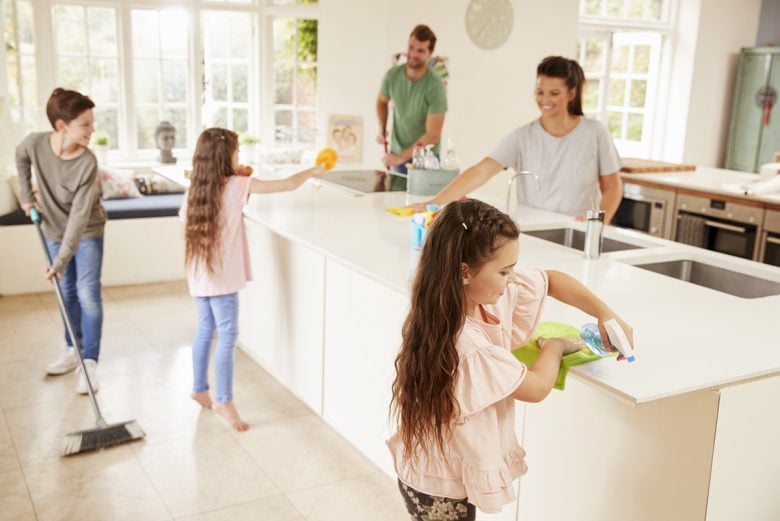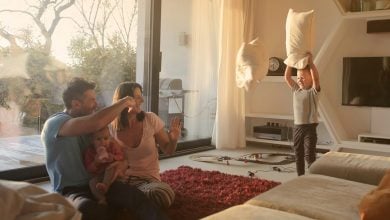
Do your children leave a trail of mess behind them?
You’ve felt it. Messy, cluttery spaces create tension in the space of your home. You don’t want to constantly be picking up after your family. But they won’t pick up after themselves. What do you do?
Carol and Anne share the conversations that need to happen long before you’re frustrated. You’ll get everyone on board with a cleaner home.
This Episode’s Parenting Practice
This week, set aside a conversation time as parents to decide the level of cleanliness you want to create in your home. Do this at a time when neither of you is frustrated. Then, enroll your children in your choices. Set up a system that supports you. And then recognize the successes you all create.
Transcript of podcast episode
Anne: You have until the end of the day to put all your things away or I’m going to do what I want with them.
Carol: Welcome to the “Child Whisperer” podcast. I’m your host, Carol Tuttle, author of the bestselling parenting book “The Child Whisperer.” I’m with my co-host, Anne Tuttle Brown.
“I’m a Type 2. I have a Type 4 nine-year-old son and a Type 4 husband. They are probably two of the messiest people in our house. Clothes are all over the floor, messy at the dinner table, and a trail of books, socks, and shoes all through the house. Neither of them see me as a voice of authority and they don’t like me to touch their stuff. How do I maintain the cleanliness I like in my home without conflict, and why is it that my two Type 4s are the messiest? I thought they were supposed to be the clean ones.”
Well, this has a lot of opportunity, too, for things to change for the better. That is true, that Type 4s have a natural gift for structure, order. They tend to be more minimalist. They have a more still reflective quality to their inner being, so they prefer their outer world to have less movement. There is an all or nothing quality to a Type 4 that the things that they apply their nature to, their tendencies, their gifts, they’re very much invested at a high level or not at all. So this could be the, “We’re not at all invested in managing our space,” the same way other Type 4s just naturally will.
And I found it interesting in the way she posed her question was,”How do I maintain the cleanliness I like in my home?” where she’s talking about what I consider shared space in a family system. These aren’t private spaces like bedrooms, maybe offices, workspaces. This is shared space. It’s, sort of, the family public space, and I have a different view of what should go on in shared space than private space. Because shared space, there needs to be a mutual understanding of what level of cleanliness are we choosing as a group of people in a family. And we’re all now choosing to maintain that level of cleanliness and what habits are we going to employ to achieve that.
If this is only coming up in the moment of the frustration, for example, you’re noticing the mess, things are strewn out through the family room, or the kitchen is left messy, and you’re now just approaching it in the moment and you’re frustrated, that’ll feel like nagging and it’s ineffective because there’s not a plan that’s been set in place where it can now be maintained.
Anne: Or clear expectations for the whole family space, do you have certain rules like…
Carol: You’re trying to correct something in the kind of the heat of the frustration rather than, again, what’s our strategy as a family? What’s our plan?
Anne: Have you ever had a sit-down conversation with your spouse outside of that moment to talk about what’s important to you? What is your maintain the cleanliness in your home? What do you like? What’s your standard? What’s his? And is there wiggle room or do you need to pick up the slack because your standard is higher than the rest of the family? I mean you have a very high standard…
Carol: I’m very immaculate so I don’t expect everyone to be at my standard.
Anne: So how did you maintain that?
Carol: Yet, I do expect our shared space to have a cleanliness quality, so people weren’t free to just leave their stuff anywhere, that you picked up after yourself. That was just something we trained you to do. You pick up after yourself. I think, too, with the Type 4, you’re dealing with two Type 4 family members, they respond very well to reason and that makes sense, and reasonable requests to say, “This is our shared space, this isn’t your private space. What you do in your closet, it’s not my business. Yet, this is our family space.” And we’re teaching our children to either maintain order and cleanliness or to not care at all because they’ll take that in…
Anne: Because mom will take care of that. Are you training your family that you’re gonna pick it up?
Carol: Are you the pickup person that you’re trying… Are you trying to get the level of cleanliness by being the one that makes up the difference? That won’t work and you’re just going to get frustrated and they’re going to hear about it on a routine basis.
Anne: I recently had to catch myself in this habit because I would just kind of clean up after my kids after they’d gone upstairs to bed. I just…I’m faster at it, I can just get it done. And my daughter was just leaving things around, and so I threw something that she had made in the garbage and she said, “Mom, why did you throw this away?” I said, “It was sitting on the counter for two days. I figured you didn’t want it anymore.” And she said, “No, I want it.” She took it out of the garbage and I said, “You have until the end of the day to put all your things away or I’m going to do what I want with them, which would be throw them away.”
And so she took that seriously and she took and put it away. So you could have family rules, you know, anything left downstairs after 9:00 goes in a bag or it goes to the thrift store or it gets thrown away, you know, you can be really serious about that. You could also say what happens in your room if you don’t have a priority for that and your child doesn’t either, you keep the door closed. But if you do have a standard to have your kids’ clothes hung up on hangers and folded nicely and you have a Type 3 five-year old, then you’re going to be the one hanging the clothes up and folding them nicely.
Carol: I go into this in The Child Whisperer, as far as managing space and what is supportive for each of the 4 Types to learn space management so that they are trained how to keep order and cleanliness in a space. I think that’s just good behavioral tendencies to develop. And so, in The Child Whisperer book, you actually can read about what will support each of the four types in developing those skill sets.
These are just life skills that you’re teaching your children. Yet the parents need to come together, first of all, and decide, “What do we want for our family space? What’s our level of cleanliness that we want to achieve and supporting our children to be able to all of us together maintain that.” If you’ve not had that conversation, then there’s no agreed outcome, and so you’re going to just have a battle of the wills because a type four doesn’t want to be told what to do, and especially if it’s done in a way that feels shaming to them in front of other family members, they’re just going to get resistant and want to control it and say, “I’m going to do what I want just because I don’t want you telling me what to do here.” So everybody needs to be enrolled because it was a mutual decision by the parents that then is taught to the children.
Anne: And then I would say, “Make it the house rules, not Mom’s rules.” My Type 1 sister has a Type 4 son and when he was really little she created the breakfast rules. It was kind of like the morning routine. And she pinned them on the board, and those were the breakfast rules, not Mom’s rules, and he respected that as kind of an outside authority and that everyone operated by and not just, “Mom is putting this on me.”
Carol: Yeah, you might even write them all out and list them, and, again, rewarding the positive behavior by verbally acknowledging how great everyone’s doing. And the consequences, you lose your stuff. Jenny used to do that, my oldest Type 1 daughter. She would just gather up all the toys that were left out. They knew if they were left out and not put away, they didn’t see them for awhile.
Anne: You had a cause called a Gunny Sack. We had one of those when you were young too.
Carol: Yeah. And I put it in there and then…
Anne: You would put our stuff in piles and say, “Take this up by the end of the day or it’s gone.” You would keep our things in piles.
Carol: I’ve been doing that since I was a kid. I did that with my mother’s stuff. I was like the neatest family member growing up.
Anne: And your third-grade teacher…
Carol: I’ve been tidying up since I was five.
Anne: Your third-grade teacher wrote on your report card, “Every classroom needs a Carol.”
Carol: To help keep it tidy.
Anne: That’s right.
Carol: I have a knack for keeping things tidy. My husband is a Type 2. There’s a trail. If I’m out of town and he’s home by himself, I guarantee you, there’s piles and trails of where he’s been, and he has more stuff around than I choose to have. Now, when I’m at home, he respects the fact that we’ve agreed that there’s certain counters that can get stacked up and stuff gets put on them, but not every counter that you turn around and look at it in the kitchen. There’s just…there is one and you’ve seen it. It gets piled up and that’s great…
Anne: And you’ve designated that as a space where that can happen.
Carol: Yeah. Just put it over there. And he doesn’t always remember. I just move it. I don’t make a big deal about it. He’ll leave shoes out and around. Because I like things put away, I’m okay now just cleaning up a few things. He tends to not wipe kitchen counters when he cleans the kitchen. That’s kind of an ongoing…
Anne: I don’t understand that, right?
Carol: I don’t either.
Anne: The kitchen’s not cleaned until the counter is wiped.
Carol: Now I have a choice, either make an issue out of it again or just wipe the counter. It probably takes less energy just to wipe the counter.
Anne: Because it’s a priority for you.
Carol: It is.
Anne: I would look at what can you do to make the cleanup easier? Do you have too much stuff? Get rid of stuff. And are there too many steps? Recently with my Type 3 daughter, there were clothes all over the floor, and I told her, I was like, “I think your room is beautiful and I want to enjoy it, and it’s the first room we see when we come up the stairs and it was just clothes all over the floor.” So I said, “You need to clean it up or I’m going to shut the door.” And she expressed that they were… It was too hard or she would forget. And I looked at the closet space and she has bins, and we just throw all the clothes in. I don’t worry about folding them, we just… But she had to pull the bin out, put the clothes in. So I got rid of that system, put all the bins on the floor and now she can just throw it in and I don’t have a…
Carol: She just throws it in her closet and shuts the door.
Anne: Yeah. She’s a Type 3. She’s really rough on her clothes. We get most of them as hand-me-downs or thrift stores, so I really don’t have a high expectation for her to keep her clothes nice. As long as they’re put away and she’s done a much better job now that there’s one less step.
Carol: I like that. The priority was keeping the room clean, not in… You’ve got to learn how to fold and stack clothes and hang clothes. It was just, the goal here is maintaining a clean room. How can I make that easier for you?
Anne: And with her bed, like not having a top sheet, just having one little blanket that she can straighten out really easily. That makes it easier for her, and just less stuff. Getting rid of it has made it a lot easier to tidy up.
Carol: So, again, back to the question that came in for this week, how do I maintain the cleanliness I like in my home? The next step would be, and this is the parenting practice for the week, how to get everyone on board to keep the house clean, orderly, and tidy. Have you come together as a family. First, parents. Have the parents come together to make that decision? Now, you want to enroll your children and set up a system that supports that, with some consequences and some rewards in recognizing the successes that are going on. And even come back together as a family and talk about how’s everybody felt in our cleaner home? Do you prefer this? Give attention to it. It makes a difference. It changes the energy. Messy, cluttery spaces create tension in the energy of the space. When there’s orderliness, there’s more space for peace and harmony because energy responds to how we manage our space. So let more peace and harmony be in your space by maintaining it.
Thanks for listening. For more support, go to thechildwhisperer.com where you can purchase the book, Subscribe to our weekly parenting practice email, and find a transcription and audio of the “Child Whisperer” podcast.
Anne: If you’re listening on iTunes, thank you for leaving a review. If you have a parenting question, please send it to [email protected].



